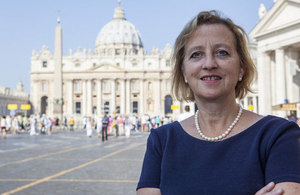Modern slavery: The UK makes common cause with the Holy See
The British Ambassador to the Holy See, Sally Axworthy, writes for the Holy See's newspaper L'Osservatore Romano, 5 October 2017.

Sally Axworthy, British Ambassador to the Holy See
In 1833 the UK passed the Abolition of Slavery Act, abolishing slavery in the British Empire. Nearly two hundred years later, the fight waged by William Wilberforce and his friends is not over. Recent estimates suggest that around 40.3 million people from all over the world are victims of modern slavery. A victim may be a bonded labourer in a brick kiln, a domestic worker trapped far from home, a forced labourer in agriculture or a girl trafficked into prostitution (1). One in four victims is a child. The victims are typically vulnerable, socially excluded, and unprotected by the justice system.
The British Government is doing its utmost to end modern slavery. We are of course not perfect, but we are developing greater knowledge and expertise that we are keen to share. In 2015, parliament passed the Modern Slavery Act, which brought together existing trafficking and slavery offences, allowed the seizing of traffickers’ assets, and required large companies to make annual statements on the absence of slavery in their supply chains. In 2015 and 2016, 63 individuals were prosecuted under the Act. We have an Independent Anti-Slavery Commissioner, Kevin Hyland, who spreads good practice on the prevention of modern slavery – and works closely with the Catholic networks.
Because this is an issue where the UK makes common cause with the Holy See. His Holiness Pope Francis’s repeated condemnation of modern slavery has been vital in bringing the issue to public attention worldwide and mobilising action to end slavery. Working to end forced labour, modern slavery and trafficking in persons is, as Archbishop Gallagher has said, one of the defining priorities of his papacy.
A worldwide problem needs a worldwide solution, so at the UN General Assembly on 19 September, at a meeting convened by Prime Minister Theresa May, 37 states including the UK and the Holy See launched a ‘Call for Action’ which, if implemented, will go a long way to bringing perpetrators to justice, supporting victims, and ensuring the products we use are not produced by forced labour. The Pope tweeted in support: ‘Let us work together to find concrete solutions to help the poor, refugees, victims of modern forms of slavery, in order to promote peace.’
Our Prime Minister May has made clear that her faith motivates her to take action. She recently said ‘I think my faith always informs what I do, and it is part of what drives me in a number of areas, including fighting social injustice.’ She sees the Churches as part of the solution, talking to Cardinal Nichols and the Archbishop of Canterbury regularly about the issue. Cardinal Nichols has taken a leading role: he has convened the Santa Marta Group, which promotes collaboration between police chiefs and bishops; he has set up a refuge for trafficked women in London, and a research institute to ensure victims’ experiences inform the authorities’ response. The Church of England is about to launch The Clewer Initiative, which will build dioceses’ capacity to respond to modern slavery in their communities.
Archbishop Gallagher at the UN explained the special contribution that the churches make: ‘Experience has shown that many victims are wary of trusting law enforcement authorities, but that they confide their stories more easily to religious personnel, especially religious sisters, who can build their trust in the legal process and provide them safe haven and other forms of assistance.’ ’’ I saw this for myself on a visit earlier this year with Sister Eugenia Bonetti to one of the religious houses that looks after victims of trafficking. At the convent, six shy Nigerian girls told us a little about their experience of being lured to Italy with promises of good jobs, abused at camps in Libya, and saddled with huge debts which they were required to pay off by working in prostitution. They talked about their worries for the safety of their families now that they had escaped. I saw the endless patience with which the sisters attempted to educate the rescued women, teach them Italian, and prepare them to set up businesses when they return home.
We each have our part to play in ending modern slavery. Pope Francis is raising global awareness. Many bishops are making sure warnings about modern slavery filter out to the parishes where potential victims live. The sisters have great strengths in working with the victims and helping them make their stories known. The UK and other governments are putting in place legislation which enables their police forces to bring perpetrators to justice. Two centuries after the Abolition Act, we need to do much more of all these things to make sure that this time, slavery really ends.
Sally Axworthy British Ambassador to the Holy See
(1) Source: Anti Slavery International
